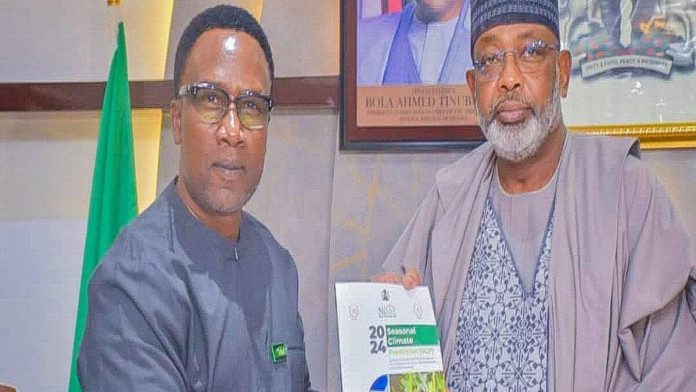News in Brief:
– Nigeria’s Agriculture Ministry and its Meteorological Agency are strengthening their partnership to combat climate change’s impact on farmers.
– The collaboration focuses on improved data access, capacity building, and stakeholder engagement to provide farmers with vital climate information for informed decisions.
Nigeria’s Minister of Agriculture and Food Security, Senator Abubakar Kyari, has called for a strengthened collaboration with the Nigerian Meteorological Agency (NiMet) to bolster agricultural production and mitigate the challenges posed by climate change for the country’s farmers.
This call to action comes amidst the release of the 2024 NiMet Seasonal Climate Prediction (SCP). Senator Kyari highlighted a Memorandum of Understanding (MoU) signed between the ministry and the agency in March 2022.
Specifically, this agreement outlines collaborative efforts in various areas, including developing an early warning system dashboard, build capacity for ministry staff and stakeholders to interpret weather data and provide targeted agro-meteorological advisories to farmers
Also, the Minister emphasised the importance of inter-agency cooperation in addressing agricultural challenges and ensuring food security. The partnership will focus on three key areas:
- Enhanced data dissemination: Ensuring farmers have access to clear and actionable weather and climate information.
- Capacity building: Equipping stakeholders with the knowledge to utilize weather data for informed decision-making.
- Stakeholder engagement: Strengthening communication channels between relevant parties.
Furthermore, Senator Kyari noted the ministry’s contribution of 10 Automatic Weather Stations to NiMet, bolstering the agency’s data collection capabilities in the agricultural sector.
NiMet, represented by Director-General Professor Charles Anosike, echoed the Minister’s sentiments. He stressed the agency’s commitment to delivering timely and accurate weather forecasts to Nigerians, particularly through various media channels and direct outreach to farmers.
He further emphasised the need to equip Nigerians, especially farmers, with the knowledge and resources necessary to make climate-resilient choices.



